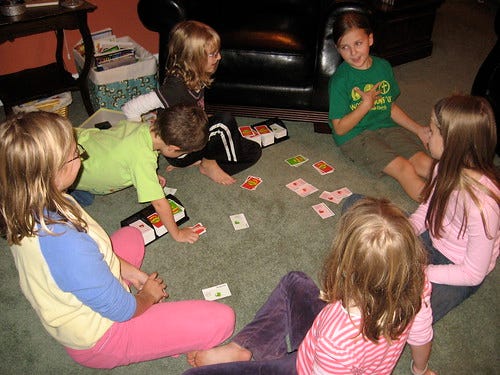Apples to Apples: Case Study in Relativism
For those about to accuse me of party-pooping or being a kill-joy, rest assured: you're not the first and won't be the last. Keep in mind you're reading the blog of a guy who actually fell asleep at his senior prom, as well as on more than one occasion has used his newborn-, toddler-, and now nearly tween-children (even when behaving well) for as good an excuse as any for leaving a party early.
In other words, I'm not a game-player. But I appreciate that you might be. Just don't ask me to play with you. Ever.
That said, why blog about the game Apples to Apples? More than the fact that our family owns it, Megan and the girls love it, and we've had neighbor friends over last night and today, I'm writing about the game because it's perfect to teach kids about relativism.
I know, I know: leave it to me to ruin a perfectly good game. But stick with me (and no, I don't think the game is evil, nor have I thrown ours out). For those unfamiliar, here's the basic gist of Apples to Apples, according to the website Love to Know:
"The game is played by the Judge selecting one card from one deck and dealing cards from the other deck to the players. The object of the game is for the players to select the best card from their hand to match the word on the card selected by the Judge."
But here's what makes it "fun" (or so I'm told): the role of the Judge rotates, so the whole point of the game becomes trying to choose not what goes together, but what you think the person thinks goes together. This, of course, can vary depending on the Judge's relationship to you, not to mention his or her preferences, mood, or reason for choosing (or not choosing) what you present as a match.
In other words, egoism, which is a form of relativism. Thomas Hobbes would love this game; David Hume as well.
For instance, here's a round from my kids' Apples to Apples game last night:
Judge: my seven-year-old daughter
Apple card: crazy
Options: my family, cats, penguins, fairiesI might have thought my daughter would have labeled her family crazy (at times, we would certainly qualify). And yet, knowing my daughter as one particularly attune to others' feelings, she would never say that about us (or anyone else). She loves cats and likes penguins, but she doesn't think of them as crazy; they're just animals. But fairies? She's crazy about fairies (or, I should say, the idea of fairies), so that's what she chose. For her, crazy equals fairies.
Another round:
Judge: our friends' nine-year-old daughter
Apple card: dull
Options: pirates, mashed potatoes, orange juice, snowboardingPersonally, I would have chosen snowboarding here, because even after living in Colorado for twelve years, I just don't get snow sports (something about still being able to walk at the end of the day, etc.). However, as our friends' nine-year-old daughter (who is as black and white in the decision-making process as they come) was the judge, three guesses as to which she picked? Yep, mashed potatoes. For her, dull equals mashed potatoes.
Again, I'm not trying to bash Apples to Apples - it's an entertaining game and kids of all ages tend to like it (even some of my high school students are fans). Instead, I'm thinking that here's a perfect opportunity to teach our kids about worldview and human nature by helping them recognize what's really going on that makes the game so enjoyable.
When we're the Judge, we get to make the matches, while everyone else trying to win has to please us to do so. We don't have to have good reasons (or any reasons at all) for what we choose - the matches are in the eye of the beholder - and we can even choose against reason to spite someone else just because we can.
But what happens when we're not the Judge? What about when someone (or Someone) else is? Hmmm.
If you never invite me over for board games, I'll completely understand. And don't worry: I'll probably be relieved.




